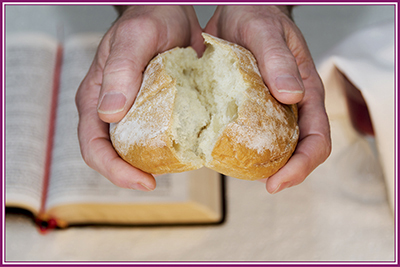Early in the morning, there are times when my young daughter crawls into my lap and asks, “What are you reading, Mama?” I imagine a similar curiosity from young children in Bible times as they listened to their parents teach about God and various aspects of living His Word, including observing divinely instituted practices, such as the Passover.
Exodus 12:26:
And it shall come to pass, when your children shall say unto you, What mean ye by this service [Passover]?
The parents would then tell them about the yearly memorial of the Passover and how it was a special time set aside to remember God’s deliverance and their freedom from the bondage in Egypt. Since the Old Testament law, of which the Passover was a part, was fulfilled by the accomplishments of Jesus Christ, a child living today in this Age of Grace would be observing holy communion rather than the Passover. This child might ask, “Why is holy communion so important today?”
This would be an open door for the parents to teach about the significance of Jesus Christ’s broken body and shed blood. They could share about the greatness and completeness of the deliverance believers today have available in the memorial of holy communion. A comparison of the memorials of the Passover and holy communion can help us realize the magnitude of the benefits now available from observing holy communion, which includes receiving whatever deliverance we need.
Before we delve into the details of the broken body and the shed blood, let’s cover the background of both memorials to see their purpose and how a similar thread of believing was required of the participants. The first Passover was God’s loving response to the children of Israel’s cry for help; He sent Moses to lead His people out of the bondage in Egypt. In preparation for the Israelites’ deliverance from this situation, God gave Moses instructions to relay to them, specifically to sacrifice a lamb.
Exodus 12:3,5-8,11:
Speak ye unto all the congregation of Israel, saying…take to them every man a lamb….
Your lamb shall be without blemish, a male of the first year: ye shall take it out from the sheep, or from the goats:
…kill it in the evening.
And they shall take of the blood, and strike it on the two side posts and on the upper door post of the houses….
And they shall eat the flesh in that night….
…it is the Lord’s passover.
Two significant aspects of this Passover lamb are its flesh and its blood. As they heeded these two specific instructions—which were to (1) put the lamb’s blood on the upper and side posts of the door and (2) eat the lamb’s flesh—God covered their sins, protecting them from the destroyer, and He took care of all their physical needs. The blood they sprinkled literally spared the lives of their firstborn sons, and eating of the sacrificial Passover lamb was for their physical wholeness. Carrying out these physical acts was the believing action that God gave them to take. They believed the Word they were given and acted upon it. They received God’s plan of deliverance from bondage, having spiritual atonement for sin and physical healing for their bodies.
At that time God instituted the memorial of Passover for the children of Israel to observe once a year to remember His mighty hand of deliverance from their bondage in Egypt.
Exodus 12:14:
And this day shall be unto you for a memorial; and ye shall keep it a feast to the Lord throughout your generations….
Jesus Christ Our Passover, by Victor Paul Wierwille, tells us that “Whereas Passover memorialized the children of Israel’s deliverance from the bondage of Egypt, communion memorializes the believer’s deliverance from the bondage of sin and its consequences.”
Shortly before Jesus’ death, by revelation he instituted the memorial of holy communion during his last supper. Just as the Passover had two parts, so does the memorial of holy communion. As we eat the bread and drink the wine, we are to remember and claim what was accomplished for us in the two elements of Jesus Christ’s sacrifice, which the Apostle Paul wrote about.
I Corinthians 11:23-25:
For I have received of the Lord that which also I delivered unto you, That the Lord Jesus the same night in which he was betrayed took bread:
And when he had given thanks, he brake it, and said, Take, eat: this is my body, which is broken for you: this do in remembrance of me.
After the same manner also he took the cup, when he had supped, saying, This cup is the new testament in my blood: this do ye, as oft as ye drink it, in remembrance of me.
As part of God’s plan for mankind’s redemption, Jesus was our complete substitute. He was our Passover (I Corinthians 5:7). We observe holy communion “in remembrance” by believing that spiritual and physical wholeness are literally ours because of our lord and savior’s completed work. What deliverance God wrought through Christ!…
This is an excerpt from the March/April 2017 issue of The Way Magazine.
Copyright© 2017 by The Way International. All rights reserved.
For more information on subscribing to The Way Magazine, Click Here

